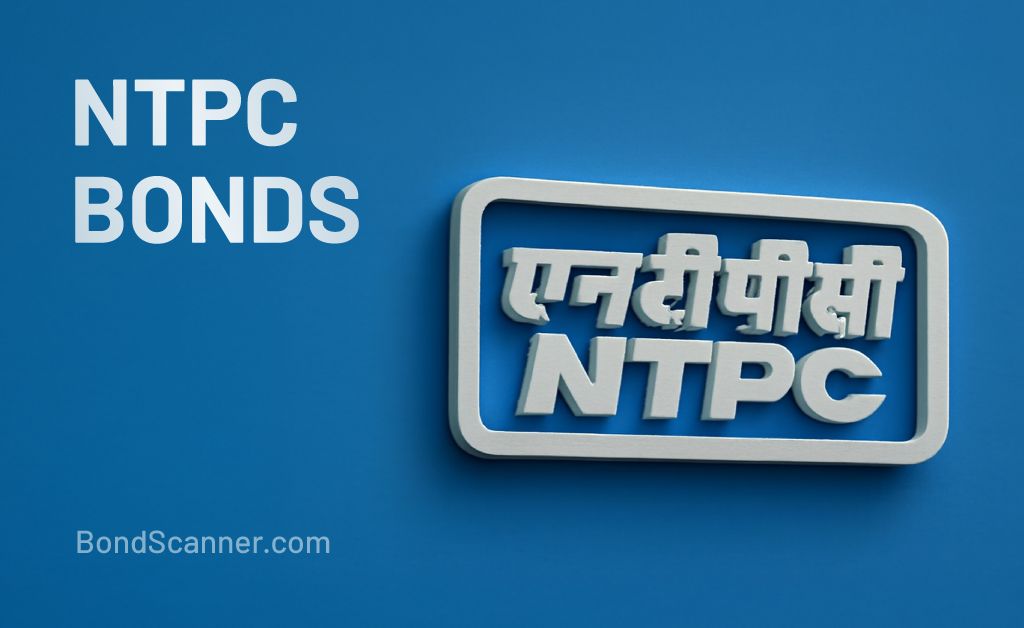NTPC Bonds: Understanding Interest Rates, Redemption & How to Buy
03 November 2025

What Are NTPC Bonds?
National Thermal Power Corporation (NTPC) is one of India’s largest power generation companies and a public sector undertaking (PSU) under the Ministry of Power. The company periodically raises funds through the issue of bonds — debt securities that offer investors fixed interest returns over a specified period.
NTPC bonds are considered relatively stable because of the company’s strong credit profile and strategic importance to India’s energy infrastructure. However, like any investment, it is important to understand the interest rate, redemption process, and associated risks before investing.
NTPC bonds are fixed-income securities issued by NTPC Limited to raise capital for infrastructure, capacity expansion, and green energy projects.
When you invest in NTPC bonds, you lend money to the company, which in return promises to pay periodic interest (coupon) and repay the principal at maturity.
These bonds are typically listed on stock exchanges and can be held in demat form, making them accessible to both retail and institutional investors.
Key Features of NTPC Bonds
| Feature | Description |
|---|---|
| Issuer | NTPC Limited (A Government of India Enterprise) |
| Type | Non-Convertible Debentures (NCDs) or PSU Bonds |
| Tenure | Varies by issue (commonly 5–15 years) |
| Interest Rate | Depends on market conditions and bond series |
| Credit Rating | Generally rated AAA by agencies like CRISIL and ICRA |
| Mode of Holding | Demat form |
| Listed Exchange | NSE or BSE |
| Taxation | Interest income taxed as per investor’s income slab |
NTPC Bonds Interest Rate
The interest rate (coupon rate) on NTPC bonds varies across different tranches and years of issuance.
For instance, older issues offered around 7–8% per annum, whereas recent PSU bond issues may offer slightly lower rates depending on market yields and credit spreads.
Since NTPC is a AAA-rated issuer, its bonds generally carry lower credit risk compared to lower-rated corporate issuers.
Note: The actual yield you earn depends on the bond’s price at the time of purchase, which fluctuates in the secondary market.
NTPC Bonds Redemption Process
Bondholders receive periodic interest payments during the tenure and the principal amount at maturity.
If you buy NTPC bonds from the secondary market, redemption happens automatically to your linked demat account upon maturity.
Some NTPC bond series may also offer call or put options, allowing early redemption or exit under specific conditions.
Investors should check the Information Memorandum (IM) or Offer Document for details related to redemption timelines and payment procedures.
How to Buy NTPC Bonds Online
Investors can purchase NTPC bonds through:
a. Primary Market (New Issues)
When NTPC issues new bonds, you can apply via authorized brokers, trading members, or platforms registered as Online Bond Platform Providers (OBPPs) with SEBI. Applications can be made using your demat and PAN details, similar to an IPO process.
b. Secondary Market (Existing Bonds)
If the bond is already listed, you can buy NTPC bonds online through your existing demat account using stock exchange mechanisms (NSE/BSE). Platforms integrated with exchanges display live market prices and yields for NTPC bond series.
Example: Series such as NTPC NCD 2025 (INE733E07JJ9) are actively traded in the secondary market, allowing investors to participate even after the initial issue closes.
Benefits & Risks Involved
Benefits of NTPC Bonds
Stable Returns: Regular interest income at a predetermined rate.
High Credit Quality: Backed by a Government of India enterprise.
Liquidity: Listed on exchanges; can be traded before maturity.
Diversification: Adds a PSU debt component to a fixed-income portfolio.
Risks Involved
While NTPC bonds are considered relatively low risk, investors should be aware of:
Interest Rate Risk: Prices may fall if market interest rates rise.
Liquidity Risk: Some bond series may have limited trading volumes.
Reinvestment Risk: When interest is reinvested at lower rates.
Hence, understanding the bond’s tenure, yield, and secondary market performance is essential before investing.
NTPC Bonds 2025 and Market Outlook
The NTPC Bonds 2025 series (e.g., ISIN: INE733E07JJ9) represents one of the company’s recent debt instruments, offering moderate yields and high credit safety.
As India transitions toward renewable energy, NTPC continues to raise funds for green projects through bond issuances. These instruments remain popular among conservative and institutional investors seeking predictable income streams from PSU-backed entities.
Market observers note that PSU bonds like those from NTPC and NHPC form a vital part of India’s debt market, contributing to infrastructure financing and offering investors exposure to stable public sector entities.
Comparison: NTPC vs NHPC Bonds
| Parameter | NTPC Bonds | NHPC Bonds |
|---|---|---|
| Sector | Power Generation (Thermal, Renewable) | Hydropower Generation |
| Credit Rating | AAA (High Safety) | AAA (High Safety) |
| Ownership | Government of India | Government of India |
| Coupon Range | 7–8% (historically) | 7–8% (historically) |
| Market Liquidity | Higher | Moderate |
Key Takeaways
NTPC bonds are fixed-income instruments issued by India’s leading power PSU.
Investors can buy these bonds using a demat account through exchange platforms.
Interest rates vary by issue and are influenced by market conditions.
Always assess credit rating, yield, and liquidity before investing.
These bonds serve as an educational case study for understanding PSU debt securities.
Frequently Asked Questions (FAQs)
1. How can I buy NTPC bonds online?
You can buy NTPC bonds using your demat account through exchange-linked bond platforms or brokers registered with SEBI.
2. What is the interest rate of NTPC bonds?
The interest rate varies by issue. Historically, NTPC bonds have offered coupon rates around 7–8% per annum.
3. Are NTPC bonds safe?
NTPC bonds are rated AAA by major agencies, indicating high credit safety. However, all market investments carry risks.
4. Can I sell NTPC bonds before maturity?
Yes, NTPC bonds listed on NSE or BSE can be sold in the secondary market based on prevailing prices.
5. What is the redemption process for NTPC bonds?
Upon maturity, the principal and final interest are automatically credited to the investor’s linked bank account via demat settlement.
Disclaimer
This blog is intended solely for educational and informational purposes. The bonds and securities mentioned herein are illustrative examples and should not be construed as investment advice or personal recommendations. BondScanner, as a SEBI-registered Online Bond Platform Provider (OBPP), does not provide personalized investment advice through this content.
Readers are advised to independently evaluate investment options and seek professional guidance before making financial decisions. Investments in bonds and other securities are subject to market risks, including the possible loss of principal. Please read all offer documents and risk disclosures carefully before investing.
Recent Blogs

GPF Full Form: Understanding General Provident Fund and Its Role in Salary
A detailed guide explaining the GPF full form in salary, its benefits, working mechanism, and how it functions for employees in India.
20 Feb 2026

Difference Between Loan and Debenture: Understanding Key Financial Concepts
Explore the key differences between loans and debentures, their characteristics, benefits, and how each works in corporate finance.
20 Feb 2026

AMO Order Explained: What It Is, Charges, Timing & How to Place an AMO Order in Zerodha
Learn about AMO (After Market Orders), how they work, charges, validity, and how to place AMO orders in Zerodha, along with key differences from pre-market orders.
19 Feb 2026